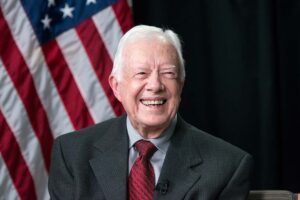Jimmy Carter, the 39th president of the United States and winner of the Nobel Peace Prize, died at the age of 101 at his home in Plains, Georgia, his son James E. Carter III announced. Outgoing American President Joseph Biden scheduled the state funeral of former President Jimmy Carter for January 9 in Washington. Biden also declared January 9 a national day of mourning across the US and ordered American flags to be flown at half-staff for 30 days from Sunday.

Date: 2014
Credit: LBJ Library
Former U.S. President Jimmy Carter, 2014.
The “Carter Center” organization announced in February 2023 that the former president, after a series of stays in the hospital, will stop further treatment and spend the remaining time in home care. In recent years, he was treated for an aggressive form of melanoma skin cancer, with tumors that spread to the liver and brain.
Who was Jimmy Carter
Carter, a small-town peanut farmer, US Navy veteran and governor of Georgia from 1971 to 1975, was the first president from the Deep South since 1837 and the only Democrat elected president between the terms of Lyndon B. Johnson and Bill Clinton. As the 39th president of the USA, he ruled with a strong Democratic majority in Congress. Four years after taking office, Carter lost his bid for re-election, convincingly, to one of the most conservative political figures of the era, Ronald Reagan, reports the “Washington Post”. When he left Washington in January 1981, he was widely considered a mediocre president, even a complete failure, largely because of a stagnant economy and high unemployment and inflation, after the 1979 revolution in Iran disrupted global oil supplies.
Invasion of Afghanistan and boycott of the Olympic Games in Moscow
A month after the Iran hostage crisis erupted, an emboldened Soviet Union invaded Afghanistan, and Carter ordered an embargo on grain sales to the Soviet Union, angering American farmers. He also ordered an American boycott of the 1980 Summer Olympics in Moscow, a move that was unpopular with many Americans and considered weak and ineffective.
The Camp David Agreement
However, Carter is credited with brokering the historic agreement between Israeli Prime Minister Menachem Begin and Egyptian President Anwar Sadat. The Camp David Accords led to the first significant Israeli withdrawal from territory captured in the 1967 Six-Day War and the peace agreement that existed between Israel and its largest Arab neighbor. Begin and Sadat jointly received the Nobel Peace Prize in 1978, and this honor was awarded to Carter 24 years later.
Nuclear weapons and diplomatic recognition of China
Carter pushed through the Panama Canal Agreement, a major step toward better US relations with its Latin American neighbors. He signed a nuclear arms reduction treaty, SALT II, with the Soviet Union, but withdrew it from Senate consideration when Soviet forces invaded Afghanistan.Taking advantage of the opening initiated by President Richard Nixon, Carter gave full diplomatic recognition to China.
Human rights and the environment
He made human rights a central theme of American foreign policy, a sharp departure from the approach of Nixon and his national security adviser and second secretary of state, Henry Kissinger. He was ahead of his time on environmental issues, and in June 1979 he installed 32 solar panels on the roof of the West Wing of the White House. In an interview with the “Washingon Post” in 2018, Carter, speaking about his time in office, said that he “regrets a lot” about the Iran hostage crisis and that he did not do more to unite the Democratic Party. He added that he is most proud of the Camp David agreements, the work on normalizing relations with China and the focus on human rights.
Prevented the invasion of Haiti
The “Carter Center” at Emory University in Atlanta, which sponsors programs in education, agricultural and health development and supports fair elections in countries around the world, was founded in 1982. At the request of President Bill Clinton, in 1994 he helped conclude an agreement that removed the brutal military regime in Haiti and prevented a possible American invasion of that country. He met with some of the world’s most notorious dictators, including Kim Il Sung of North Korea and Muammar al-Gaddafi of Libya. He has been asked to monitor elections in Panama, Nicaragua, Haiti, the Dominican Republic, Zambia, the West Bank and Gaza, and the Carter Center has monitored 115 elections in 40 countries, according to its website.